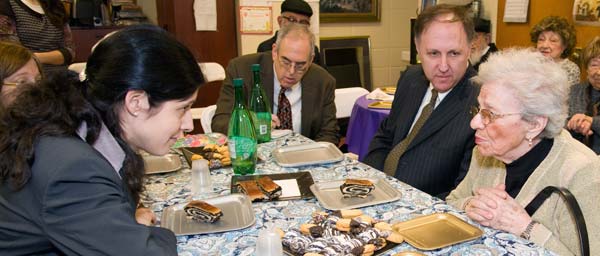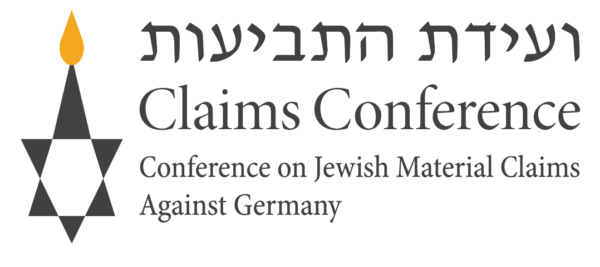New York
Activity
The Claims Conference makes direct compensation payments from the Article 2 Fund and the Hardship Fund. The Claims Conference negotiates on an ongoing basis with the German government to include additional Nazi victims in compensation programs, increase payments, and provide increased funds for social services.

Nearly half of all U.S. Jewish Nazi victims live in New York State; among them, the overwhelming majority live in Brooklyn. Nazi victims comprise about 15 percent of all elderly Jewish New Yorkers. They are amongst the neediest of all U.S. Nazi victims, with 51 percent living at or near poverty, compared to 13 percent of all Jewish elderly.
Until recently, New York State, through both the federal Medicaid program and state-funded programs, provided a comprehensive system of home- and community-based services for the elderly; however, New York, like many other states, has been meeting budget shortfalls in this area by relying on non-renewable revenue sources. Severe cuts to Medicaid homecare services and other programs were enacted in the past two years. In addition, discretionary funds from the New York City Council that were earmarked for survivor services were eliminated at the end of City Fiscal Year 2008.
The Claims Conference provides funding to more than 40 Jewish organizations in New York State to aid Nazi victims, ranging from survivor-run socialization programs (Café Europa) to comprehensive services including case management, emergency assistance, food programs, in-home services and medical programs. Claims Conference funding has traditionally been geared toward case management so that Nazi victims can access the home- and community-based services to which they are entitled. Case management provides individual assistance to Nazi victims in obtaining social services from government and nonprofit agencies, including homecare, meals and food assistance, medical coverage, and payment of medical bills and housing expenses. Caseworkers inform Nazi victims of Holocaust-related payments for which they may be eligible and assist them in their applications. In addition to case management, the Claims Conference has dramatically increased funding for homecare services – chores/housekeeping and personal/nursing care – so that New York’s Jewish Nazi victims can remain safe and healthy in their homes
In October 2012, Hurricane Sandy hit the Northeastern U.S., becoming the largest Atlantic hurricane on record and causing destruction to homes and livelihoods. In response, the Claims Conference established the Sandy Emergency Fund, designating $500,000 to emergency assistance to Holocaust survivors in immediate financial need following the devastation caused by the hurricane. The Claims Conference also facilitated donations from the German Insurance Association, the German Consulate in New York, and Allianz towards Sandy relief in affected survivor communities in Brooklyn.
Following are the agencies providing most of the services to Nazi victims in New York State.
Bikur Cholim of Rockland County, Monsey. Case management, homecare, transportation, emergency and financial assistance, medical equipment and medicine, and socialization programs.
Blue Card, New York. Financial assistance to support emergency rent subsidies, telephone emergency assistance response systems, prescription drugs, homecare, transportation, food, and medical and dental care. It also provides assistance to Nazi victims throughout the U.S. for personal emergency response systems as well as emergency services for Nazi victims. In 2012, the Claims Conference initiated funding for Blue Card’s homecare pilot program, providing homecare funding for survivors who live in areas of the U.S. outside of service area of Claims Conference-funded organizations.
Boro Park YM-YWHA, Brooklyn. Adult day center program exclusively for Nazi victims four days a week, where activities include exercise, creative writing workshops, crafts, knitting, beading, lectures on health-related issues, and weekly outings to parks, museums, and concerts. There are also specialized programs for male survivors and those suffering fromaffected by Alzheimer’s disease.
Chevra Hatzalah, Brooklyn. As the largest Jewish volunteer ambulance service in the U.S., Chevra Hatzalah found that approximately 60 percent of the elderly utilizing its services were Nazi victims. Hatzalah volunteers in Brooklyn are uniquely prepared to serve survivors through their language skills and special sensitivity training designed to alleviate Nazi victims’ anxieties and fears during an emergency situation.
Community Improvement Council, Spring Valley. Homecare, transportation, meal delivery, and socialization programs for Nazi victims in Rockland County.
Guardians of the Sick Alliance/Bikur Cholim of Boro Park Chesed Organization, Brooklyn. A consortium of five participating Bikur Cholim organizations, the Ezer L’Cholim Project provides Nazi victims in Brooklyn and Staten Islandwith case management, homecare, transportation, emergency and financial assistance, meal delivery, friendly visiting, medical equipment, medication, minor home modifications, socialization programs, and personal alert systems.
Jewish Community Council of Greater Coney Island, Brooklyn. Homecare, transportation, congregate meals, meal delivery, friendly visiting, and socialization programs.
Ladies Bikur Cholim D’Satmar, Brooklyn. Meal delivery and other in-home services for Nazi victims in Queens, Brooklyn, Staten Island, and Lower Manhattan.
Metropolitan Council on Jewish Poverty, New York. Works through a network of 25 Jewish Community Councils that provide crisis intervention and a variety of home and health care services to Nazi victims throughout the five boroughs. Among its programs are case management services, transportation, emergency cash assistance, meal delivery and emergency food vouchers, minor home modifications, and homecare.
Nachas Health & Family Network, Brooklyn. Case management, transportation, medical care including health screenings and health information programs, and socialization programs.
Selfhelp Community Services, New York. Assists Nazi victims throughout New York City and Nassau County with extensive case management services, homecare, emergency and financial assistance, food programs, medical programs, and specialized socialization programs, including day programs at senior centers and Jewish community centers in areas with significant populations of Nazi victims. Selfhelp also runs a program dedicated specifically to helping Russian-speaking Nazi victims in Brooklyn.
Pesach Tikvah/Door of Hope and United Jewish Organizations (UJO) of Williamsburg, Brooklyn. Serving the Orthodox and Hasidic survivor communities in Williamsburg, UJO and Pesach Tikvah have been combining efforts to provide comprehensive services to Nazi victims since 2005, includingprovides case management, homecare, transportation, emergency and financial assistance, food packages, meal delivery and congregate meals, medical equipment and medication, and minor home modifications.

